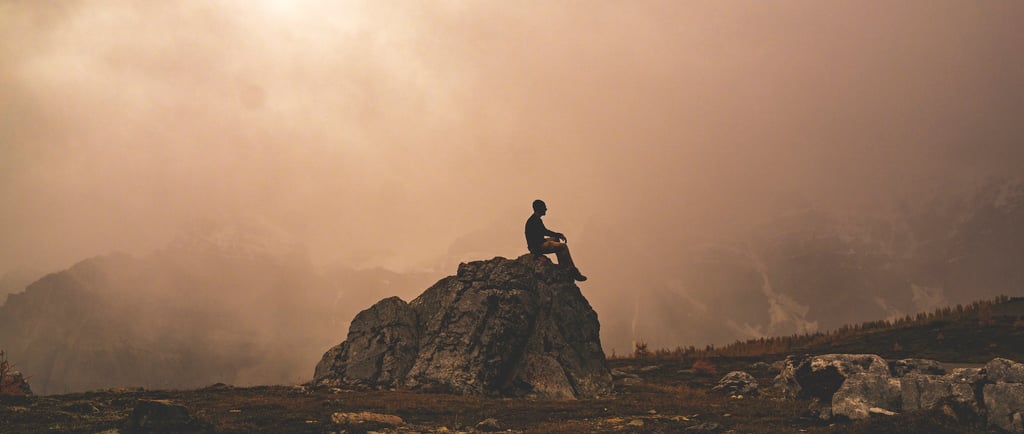Loneliness is Not the Culprit
People avoid solitude for different reasons: some fear their own uncertainty and lack of direction, while others fear confronting unhealed pain. Understanding the root of this discomfort is the first step towards embracing the gift of silence.
10/16/20255 min read


There are people who dislike being alone, though what sits beneath that discomfort can differ entirely from one person to another. Loneliness is a vague word, one that looks simple enough until you try to describe what it feels like. Some people meet silence and feel a deep ache, as if the quiet itself were a kind of judgement. Others meet it with restlessness, the kind that feels as though something unspoken is pacing around inside them. On the surface, both kinds, people who avoid solitude, who fill their schedules with company or noise, may appear similar, but underneath, their inner stories are very different.
The first kind are those who learned, somewhere along the line, to let others steer the way for them. This might not be because they are lazy or unmotivated. Often, it grows from a pattern seeded long ago, perhaps when they were small and the world seemed too large to handle on their own. Maybe there was always someone older or louder who made the decisions, who smoothed out the rough edges of life before they had a chance to try. When that becomes the rhythm of your upbringing, the silence of being alone can feel like standing in front of a blank page without a pen. You don’t quite know what to do, and the longer you stare, the more you question whether you ever knew how to write at all.
People like this often lean on others to decide what direction to walk in. They may follow a friend’s choices, a partner’s plans, or a parent’s script, and the idea of being alone feels unsettling because it forces them to confront their own uncertainty. Confidence grows from small acts of decision-making, from seeing that the world doesn’t collapse when you take a step on your own. But if those moments were taken away too early, it can leave a person stranded in adulthood without the quiet assurance that they can rely on themselves.
The second kind of person may appear, on the surface, to be the opposite. They are lively, curious, brimming with enthusiasm. They chase experiences with a hunger that looks like confidence, and in many ways, it is. But their restlessness has a different flavour. Beneath all that brightness lies something unhealed. At some point in their life, something hurt them deeply, maybe a loss, a betrayal, or an old ache they didn’t know how to process, and instead of facing it, they pushed it aside. They kept going, thinking that if they just stayed busy enough, it would eventually fade. Yet pain that is buried alive doesn’t die quietly. It waits. It waits for the quiet.
That’s why people like this can’t stand being alone. Silence acts like a mirror that shows them what they’ve tried to forget. When there are no distractions, the mind turns inwards, and what it finds there can feel unbearable. Suppressed emotions don’t announce themselves neatly; they come as unease, as anxiety, as an inexplicable sense that something is wrong. So these people run from silence, not because they don’t like themselves, but because silence reminds them of something they can’t yet name.
The mind, in its strange wisdom, develops clever ways to protect us. When it senses pain, it creates distance from anything that might trigger it , even something as innocent as a quiet afternoon at home. The person finds themselves needing background noise, constant movement, or the company of others, not realising that these things have become a form of emotional armour. They are protecting themselves from the mind’s invitation to revisit old wounds.
But that protection comes with a price. When we never sit still, we lose the chance to discover what truly stirs us. An empty space, whether in time or emotion, is uncomfortable at first, but it is also the space where creativity begins. Every idea, every new beginning, starts from a kind of emptiness. When we fill that space too quickly, we lose the opportunity to see what could have taken shape there. It’s like painting over a blank canvas before we’ve even thought about what we want to create.
So while the first type of person avoids solitude because they doubt their own direction, the second avoids it because solitude threatens to bring back feelings they’ve spent years avoiding. Both resist quiet for different reasons, yet both miss the same gift that quiet offers.
I think about how silence used to be a natural part of life. Before screens, before endless pings and notifications, people sat by fires or looked out at the sky without feeling they had to fill every second. That stillness wasn’t a luxury; it was part of being alive. But now, being alone often feels like an inconvenience, as if the absence of noise means something’s wrong. We fill the space because we’re scared of what might echo in it.
It helps to understand that both kinds of people are, in some way, protecting themselves from fear of incompetence for the first, fear of pain for the second. Both are acting out patterns formed long before they became aware of them. But awareness changes everything. Once you can name what drives your discomfort, it no longer controls you in the same way. It becomes something you can observe, even be kind to.
Being alone is rarely about the absence of people. It’s about the presence of yourself, unfiltered. When you sit in that space long enough, you begin to notice things that were once invisible: the way your thoughts loop back to the same places, the way your emotions shift like weather, the way silence slowly starts to soften instead of sting. You begin to hear your own tone again.
I’ve met people who say they’re afraid of being alone because they don’t like their thoughts. I think that’s a bit like saying you don’t like your reflection because the lighting is bad. What you’re seeing is what the light is showing you. We all carry shadows, memories, things we’d rather not see. But being alone isn’t about fixing all of them at once. It’s about letting the light stay long enough for you to see that you are still whole, even with the shadows.
The mind craves stimulation, and in moderation, stimulation keeps us alive and curious. But when it becomes constant, it starts to function as anaesthetic. We numb the parts that hurt, but in doing so, we also numb our sense of joy and wonder. To live fully, you need to let silence in sometimes. It’s in that silence that the mind untangles itself.
I often think of solitude as a kind of honest conversation, not with words, but with presence. You sit down, metaphorically, across from yourself. At first, it’s awkward. You fidget. You want to check your phone or turn on music. But if you stay, if you let the awkwardness settle, something begins to shift. You start hearing the quieter layers of thought that usually get drowned out. Some of them are painful, yes, but others are quietly wise. That inner voice that knows what you actually need doesn’t shout. It waits for you to stop talking.
So if you find yourself restless in silence, don’t rush to label it as loneliness. Ask yourself what it’s protecting you from. Is it the fear of making your own choices? Or the fear of what you might feel if you stop distracting yourself?
